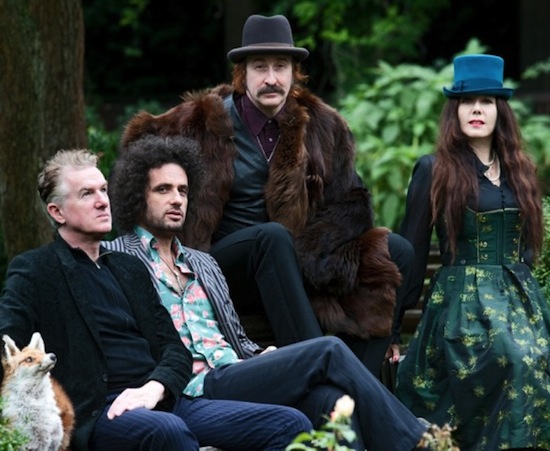The Ministry Of Wolves, not content with already releasing one of our favourite soundtracks of the year – Music From Republik der Wölfe, their score to Theater Dortmund’s production based on the Brothers Grimm tales as reworked by Anne Sexton – are putting out another album. Happily Ever After, due on November 10 on Mute, collects some previously unheard tracks by the four-piece of Alexander Hacke, Mick Harvey, Danielle de Picciotto and Paul Wallfisch, as well as German language versions of songs from their debut. From the latter camp comes ‘Die Weisse Schlange’ (White Snake Waltz), which the group have kindly given us a first play of. Not only that, but we asked Hacke to tell us a bit more about the genesis of the record, so read that below and play the track above.
Pre-orders (act sharp – it’s only a limited release of 500 copies) are over at Mute’s site, while the group will be touring the songs later this month, beginning in Bucharest’s Silver Church on September 25 and taking in a run of performances with the production at Theater Dortmund and a one-off at Berlin Volksbühne; head here for further details.
Can you tell us about the genesis of the tracks on Happily Ever After? Did they emerge at the same time as Music From Republik der Wölfe or as subsequent additions?
Alexander Hacke: As we did not know how narrative our contribution to the play in Dortmund eventually needed to be, we were considering doing German versions of the songs, or at least of some of the songs, from the get-go. Danielle’s pieces, which are now on Happily Ever After were already finished when we wrapped the initial recording session, so was ‘Rumpelstilzchen’.
‘The Wonderful Musician’ was one of the fairytales Mick chose to work with and he came up with this odd dreamy structure of a song. In the process of making the first record we had to prioritise the pieces which were definitely going to be featured in the play, so this little fella got left behind. Then we did the tune in the set of all the concerts we played this spring and personally, I’ve grown really fond of it, so I’m very happy to have it included here.
Paul and Mick finished writing and recording the German versions of ‘Rapunzel’ and ‘Der Froschkönig’ in their respective homes of Melbourne, Australia and Harlem, NYC, while Danielle and I were on a farm in Denver, Colorado, where I mixed the epic, monstrous piece ‘Die 12 Tanzenden Prinzessinnen’, which is compiled from edited-down multi-track material of about three hours of improvisations. The track consists of an entire fairytale narrated by yours truly, has all the wolves singing a gospel-like choir together and lasts about 15 minutes.
How did you come to be involved in the project in the first place?
AH: Paul not only happens to be the musical director of the of the state theatre in Dortmund, but also puts on these showcases called Small Beast there, also at the Kampnagel in Hamburg and at a nightclub in NYC, The Delancey, where he has invited Danielle and me to appear a few times – to play with our project Hitman’s Heel or do excerpts of these performances we do together, some of which are readings of her books The Beauty Of Transgression and We Are Gypsies Now, where we combine her spoken words with music, soundscapes and visuals. So when he got the commission to come up with a musical concept to go with Grimm’s fairytales for a play, he invited us to join him in the endeavour. When it was decided that we would need a fourth collaborator, we suggested asking Mick Harvey whether he would be interested in joining us – luckily he was and the rest is, as they say, history.
What are your own personal memories of the Brothers Grimm tales? Can you remember reading them when you were younger?
AH: Well, frankly as a kid I was never that impressed with them. My parents left me to my own devices after bedtime quite frequently when I was still fairly little, and I would sneak out and watch TV by myself, late night horror shows of the early seventies mostly, you know? So I had my mind blown by Rosemary’s Baby, The Tenant or older stuff like The Fly and Invasion Of The Body Snatchers instead. I learned to value the work of the brothers from an entirely different perspective much later in life.
Have any of the individual stories or characters emerged as a favourite for you over the course of the project?
AH: I picked to work on ‘Iron Hans’ and ‘The 12 Dancing Princesses’, because they are my favourites. The former for its association with the concepts of initiation and spiritual transformation I detect in there, and the latter because it tells me that if one would be versed in the art of lucid dreaming one could follow those naughty girls on their journey to the netherworld just like the clever soldier does, and to be able to even bring back some tokens as a memento, that would be a dream come true…
Outside of The Ministry, how are preparations for Neubauten’s Lament going?
AH: We spent some pretty intense months with the subject matter last winter and came up with something… pretty twisted, I guess. It is not an easy task to deal with a human catastrophe of that magnitude. A recording of the piece as we conceived it is being mastered this month and will be released with the first show in Diksmuide in November. Our rehearsals start right after I get back from playing with The Ministry Of Wolves.


